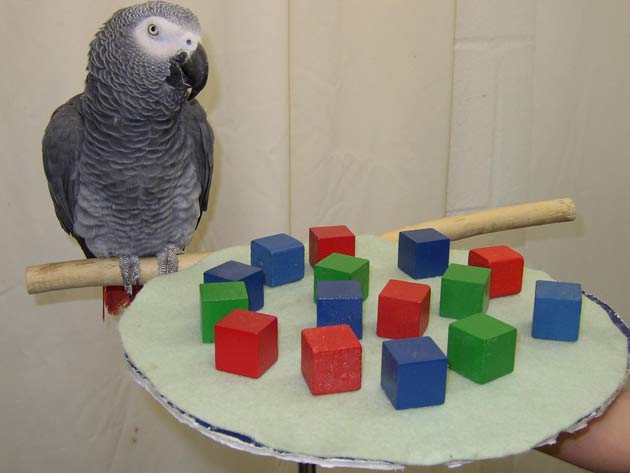No Birdbrain, Parrot Grasps Concept of Zero

A parrot has grasped the concept of zero, something humans can't do until at least the toddler phase, researchers say.
Alex, a 28-year-old African gray parrot who lives in a lab at Brandeis University in Massachusetts, has a brain the size of a walnut. But when confronted with no items on a tray where usually there are some, he says "none."
Zero is thought to be a rather abstract concept even for people. Children typically don't grasp it until age three or four, Brandeis researchers say. Some ancient cultures lacked a formal term for zilch, even as recently as the Middle Ages.
Feathered phenom
Alex is a fairly skilled counter. In a test, he said "none" when items on his tray were cleared. More trials were done, and the avian Einstein "consistently demonstrated the ability to identify zero quantity by saying the label 'none,'" the study concluded.
Alex's null may be slightly different than your nada.
"Alex has a zero-like concept; it's not identical to ours but he repeatedly showed us that he understands an absence of quantity," said Irene Pepperberg, who led the research
Get the world’s most fascinating discoveries delivered straight to your inbox.
The result, published in the current issue of the Journal of Comparative Psychology, adds to growing evidence that birds and other animals are smarter than we thought.
A 2003 study in the journal Nature, for example, found that common marsh birds called coots can recognize and count their own eggs, even when other eggs are in the nest.
Black-capped chickadees were recently found to warn colleagues of danger by chirping about the size and actual threat of individual predators. The language of prairie dogs includes a word for humans.
Some animal intelligence is hauntingly familiar, like the male monkeys that pay to see female monkey bottoms. And studies show that monkeys, dogs and rats all know how to laugh.
There are obvious limits to animal intelligence, of course. Take the 450 sheep who recently jumped to their deaths for no apparent reason.
Parroting behavior?
One question that dogs animal intelligence research is whether remarkable, humanlike behaviors are innate and truly cerebral or if a creature is just parroting a trainer.
"It is doubtful that Alex's achievement, or those of some other animals such as chimps, can be completely trained," Pepperberg said. "Rather, it seems likely that these skills are based on simpler cognitive abilities they need for survival, such as recognition of more versus less."
Pepperberg said the study could help shed light on human learning disabilities.
She now plans to find out how well Alex can add and subtract.
Robert is an independent health and science journalist and writer based in Phoenix, Arizona. He is a former editor-in-chief of Live Science with over 20 years of experience as a reporter and editor. He has worked on websites such as Space.com and Tom's Guide, and is a contributor on Medium, covering how we age and how to optimize the mind and body through time. He has a journalism degree from Humboldt State University in California.



